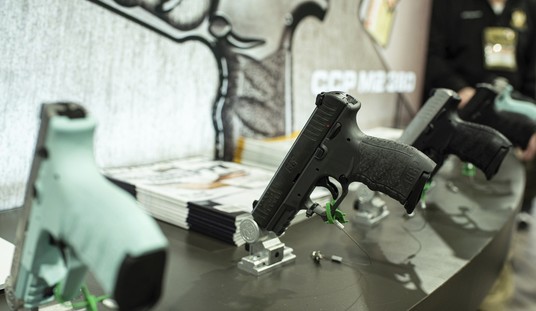Gun control activists have long claimed that suing those who make and sell firearms is a viable tactic, that it’s somehow just to blame them for what someone else has done. It was so bad that Congress took action, passing the Protection of Lawful Commerce in Arms Act to curtail that brand of nonsense.
The law did allow for exceptions, however, as it should. I mean, if a gun explodes because of faulty manufacturing, you should be entitled to sue.
But now anti-gunners are trying to use those exceptions to navigate around the protections whenever they can.
In April 2014, a shotgun purchased by a straw buyer was used in a shooting rampage that killed three people at the Jewish Community Center and Village Shalom retirement community in Overland Park, Kansas.
The shooter currently sits on death row, and the straw buyer is now a felon. The purchase also put the spotlight on Walmart, which sold the shotgun, in the form of two lawsuits filed by the victims’ families.
Experts say those lawsuits — and a growing cohort of similar cases across the country — are opening a new front against the gun industry by making one simple argument: Retailers must do more to ensure guns aren’t sold to people who aren’t supposed to have them.
…
It’s impossible to know how many straw purchases are made in a given year because investigators often only find out about them if the gun is used to commit a crime. The Bureau of Alcohol, Tobacco, Firearms and Explosives instead focuses on prevention by educating gun sellers on spotting straw buyers.
That puts sellers in a tight spot because, while they understandably want to make a sale, they’re often the only line of defense against illegal purchases.
Knowing when to make a sale versus when to get suspicious can be tough, said Greg Langner, general manager at Tactical Firearms in Overland Park, Kansas.
“When I first got into this industry about seven years ago it was kind of a tightrope to walk,” he said. “At this point, it’s just a learned behavior of knowing where the guard rails are with background checks and the legalities involved.”
The truth is, it’s almost impossible to prevent straw purchases. At the beginning of the above-linked post, the author likens it to a teenager buying alcohol.
And anti-gunners are convinced there’s some way in which gun stores can intuit their customers’ motivations at a glance.
Look, few retailers want to make a straw purchase. The margin on guns themselves are fairly low, and the hassle of getting it wrong are big, so there isn’t an advantage for them to do so. Yet it can happen.
That’s because it’s not a difficult problem to circumvent. Most people already know how to bypass the background checks despite not exactly being hardened criminals.
Suing gun retailers, however, won’t stop straw purchases. Frankly, I don’t think that much will.
But if anti-gunners keep this up, expect lawmakers to eventually put a stop to even that avenue for them, which will suck for them when there is a retailer who is complicit in arming a felon, won’t it?







Join the conversation as a VIP Member